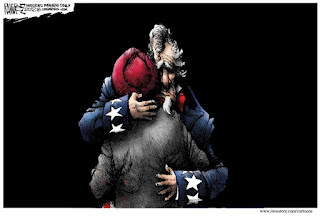"Our lives in the world point us towards something beyond the facts of our lives. Eating, drinking, making babies: this is all very well, but our lives do more than revolve around the simple biological necessities. They point us toward meaning.
"Most people, including the very large majority of those people who say they are atheists, believe that life means something. To those who believe that life means something, the moral feelings we have about justice and duty (for example) aren’t just random biological signals that flash across our neurons in response to evolutionary patterns. We sometimes can’t articulate why this is true, but we feel that it matters that we do the right thing: that we bring up our kids well, that we honor our parents and care for them when they are old, that we remain loyal to our spouses and keep our wedding vows, that we behave fairly in our dealings with other people and that we contribute to the greater good through the way we live our lives. There are people and causes for which many of us are willing (though perhaps not particularly eager) to die.
"Maybe we feel this way because we are biologically hard-wired to do so, but the fact is that the overwhelming majority of people around the world believe that life counts and that the whole is somehow greater than the sum of the parts.
"This feeling that there is some meaning to our lives is the basis, I think, not only for the Christian religion and for all religions and mystical experiences; it is the basis for the many noble forms of ethical thought and philosophical reflection found among atheists and agnostics. Anyone who feels the pull of a higher path and greater responsibilities than just blindly grabbing what can be seized is moved by a vision of something outside ones own life that compels our allegiance and respect: a vision of what matters and a sense of life’s meaning.
"That sense of life’s meaning is our sense of the transcendent: a sense that our experience points beyond itself to something important."










































